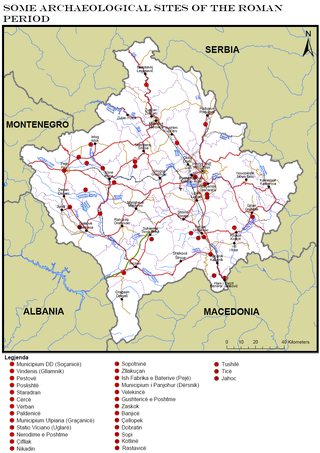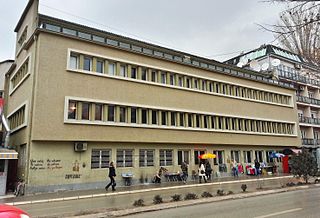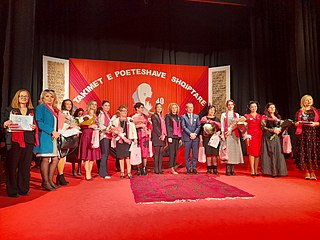Related Research Articles

The Vushtrri Castle or Old Tower are city fortifications in Vushtrri, Kosovo. It was the seat of despot Đurađ Branković (1427–1456). Later chroniclers are noted that the fort itself is derived from the times of Dušan, and that it is an old fortress with a tower in the middle of the town.

The Kosova Academy of Sciences and Arts is the national academy of Kosovo.

Vendenis was an ancient city in Dardania in Kosovo. Among three road stations that were constructed in Dardania during the Roman period, Statio Vindenis, is one of the identified stations. This archaeological site is set at the area of the village of Gllamnik. The site is located approximately 5 kilometres south of Podujevë.

The Roman heritage sites in Kosovo represent a multitude of monuments of material and spiritual culture, which reflect the Roman period in this region. Among them, a special place is occupied by those that represent the development of art, such as the plastic monuments that are more frequent, and at the same time occupy an important place, because with the presentation of figures in relief and with numerous inscriptions they speak to us enough for this period.

Viciana or Station Viciano was a Roman road station of unclear location, somewhere in Kosovo field.
The first Albanian-language school in Kosovo was opened in 1889. That was the birth of public education in the historical city Prizren. "The history of our education is a story of war of efforts. A story of a small number of people, with a great spiritual world, and with a strong will to be independent."

The Faculty of Arts of Pristina is the faculty of arts of the University of Pristina, located in Pristina, Kosovo.
Kovaçica or Kovačica, is a village in the municipality of Mitrovica in the District of Mitrovica, Kosovo. According to the 2011 census, it has 27 inhabitants, all Albanians. An alternative name of the village is Ukshinaj.

The National Institute of Public Health of Kosova (NIPHK) is the oldest and highest health, professional and scientific institution of Kosovo, which organizes, develops, supervises and implements public health policies in Kosovo. The NIPHK covers the entire territory of the Republic of Kosovo through its branches - Public Health Institutes (IPH) organized in these Regional Centers: Peja, Prizren, Mitrovica, Gjilan, Gjakova, Ferizaj.

Duboc Fortress is a fortress in Duboc village in the Vushtrri municipality in Kosovo. It is situated above Ceçan, part of the Ciçavica mountain chain, approximately 11 km southwest of the city of Vushtrri.
Pajazit Nushi was a Kosovan university professor, psychologist and scientific and social-political worker. He was a member of the Kosova Academy of Sciences and Arts.

The Gatherings of Poetesses in Vushtrri is an annual poetry festival of women and girls held in the city of Vushtrri in Kosovo, under the patronage of the city municipality. During the several decades of its existence, the Festival has awarded some of the most notable Kosovan and Albanian poetesses.

Luciano Motroni (1905–1989) was a Kosovan surgeon of Italian descent. He made a significant contribution in the field of education and professional advancement of medical personnel in Prizren, Kosovo.

The University of Gjakova "Fehmi Agani" - UGJFA is a public university located in Gjakova, Kosovo. It was originally established as a Higher Pedagogical School in 1967 and has since grown into a comprehensive university.
Bylbyl Sokoli, is a Kosovar football manager, former player and university professor. He was born in Pristina.
Irena Natalia Sawicka is a Polish linguist, Balkanologist, and Slavicist with significant interest in Albanology. She is among the world's most authoritative linguists who have studied the Albanian language and has greatly contributed to the dissemination, cultivation, and study of Albanian in Poland, as well as the promotion of Albanology worldwide.

Wilfried Fiedler was a German albanologist, balkanologist, and linguist, known for his significant contributions to the studies of the Albanian language and Balkanology.

Stantërg is a small town located near the city of Mitrovica. It is best known for its proximity to the Trepça Mines, one of the largest mining complexes in Europe. The town has a rich mining history, with the Trepça Mine being a significant source of lead, zinc, and silver. Therefore, the town is also known as Trepçë by the locals.
Esat Stavileci was a Kosovan lawyer and professor at the Faculty of Law of the University of Pristina.
References
- 1 2 3 "Mehmet Kraja". Academy of Sciences and Arts of Kosovo. Archived from the original on 2015-10-13.
- ↑ Elsie, Robert (2010). Historical dictionary of Kosovo. Scarecrow Press. p. 164. ISBN 0810874830.